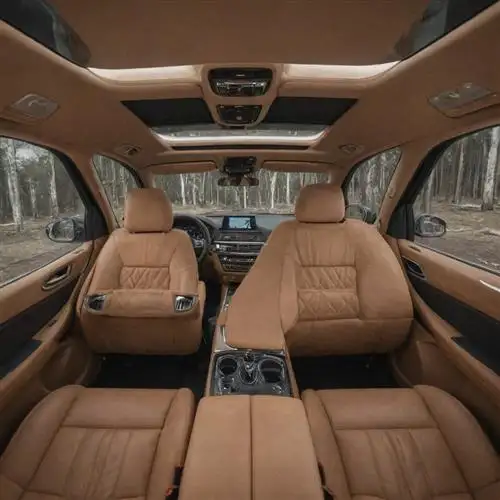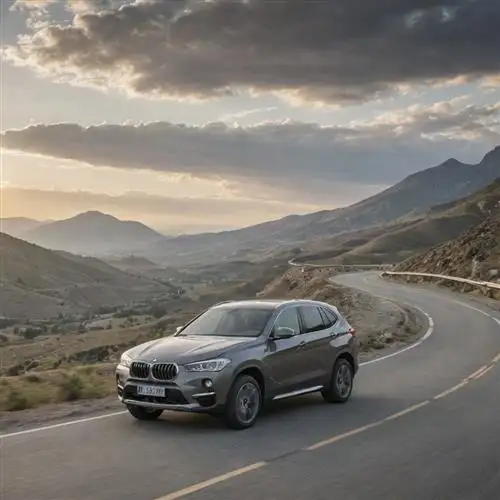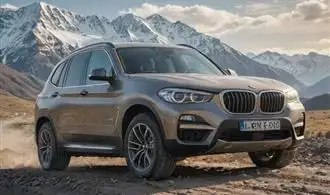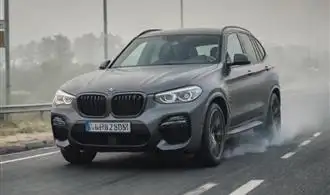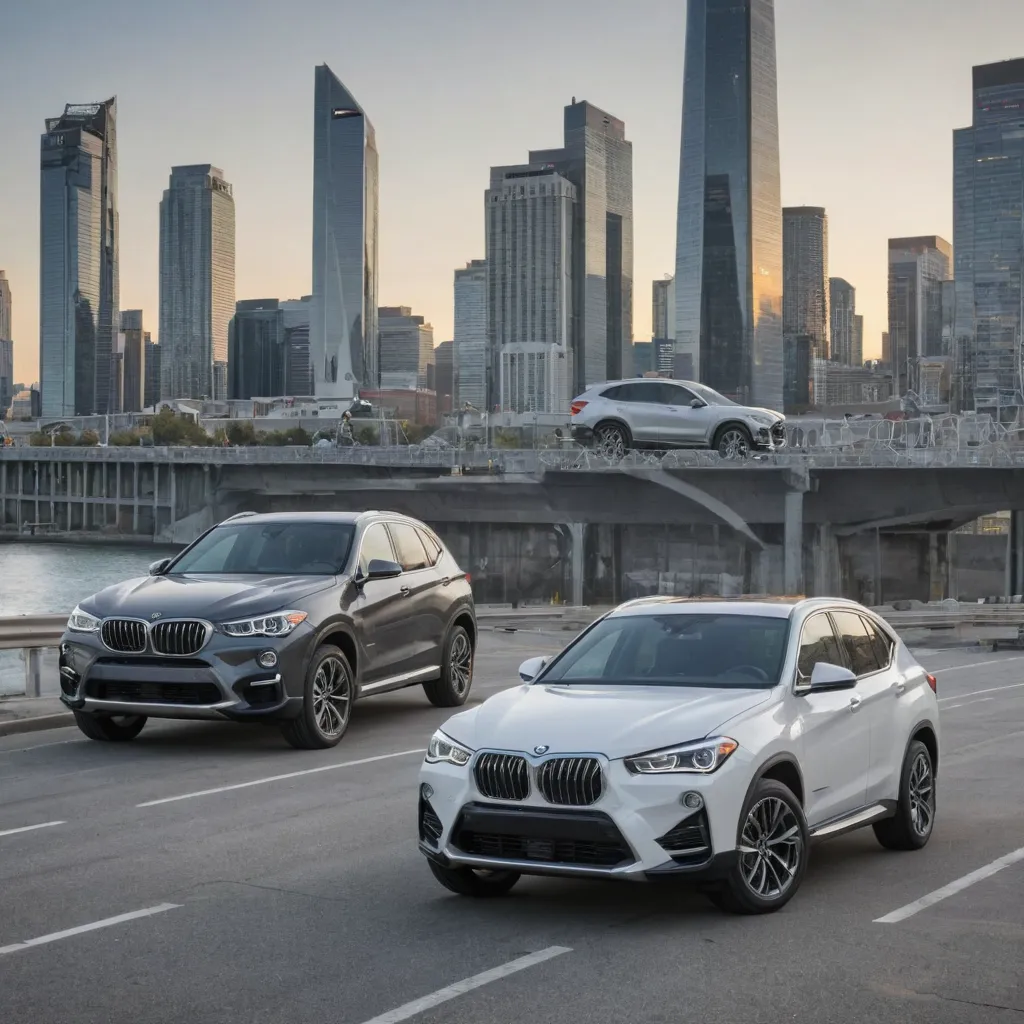
Performance Comparison
The BMW X3 and Lexus NX are both premium compact SUVs, but their performance profiles differ significantly. Under the hood, the X3 offers a range of powerful engine options, including a turbocharged 2.0-liter four-cylinder, a turbocharged 3.0-liter six-cylinder, and even a high-performance M version with a twin-turbo 3.0-liter six-cylinder. These engines deliver impressive power and acceleration, with the top-of-the-line X3 M able to sprint from 0 to 60 mph in just 4.1 seconds.
In contrast, the Lexus NX relies on a smaller 2.4-liter turbocharged four-cylinder engine, which produces less horsepower and torque than the engines found in the X3. The NX's 0-60 mph time is also noticeably slower, typically taking around 6.9 seconds. This difference in raw performance is particularly noticeable when merging onto highways or overtaking other vehicles.
The X3 also has the advantage of offering optional all-wheel drive, which provides enhanced traction and stability, particularly in inclement weather or when driving on challenging terrain. The Lexus NX is available with all-wheel drive as well, but the X3's system is widely regarded as more advanced and capable.
In terms of handling, the BMW X3 is widely praised for its nimble and responsive driving dynamics, with precise steering and a well-balanced chassis that delivers an engaging and rewarding driving experience. The Lexus NX, while competent, is generally considered less dynamic and more oriented towards a comfortable, relaxed driving experience.
Interior Luxury and Features
When it comes to interior luxury and features, the BMW X3 stands out as a superior investment compared to the Lexus NX. BMW's attention to detail and commitment to providing a premium driving experience is evident in the X3's cabin. The materials used throughout the interior are of the highest quality, with soft-touch surfaces, genuine leather upholstery, and elegant wood or aluminum accents that exude a sense of sophistication.
The X3's cabin is spacious and well-designed, offering ample room for both the driver and passengers. The seats are supportive and comfortable, with optional power-adjustable and heated/ventilated features for added convenience. The driver's seat, in particular, provides an excellent driving position with excellent visibility and a commanding view of the road.
The X3's infotainment system is among the best in its class, with a large, high-resolution display that is intuitive and easy to use. The system comes with a wide range of features, including navigation, smartphone integration, and a premium audio system that delivers an immersive listening experience. The X3 also offers advanced connectivity options, such as wireless charging and multiple USB ports, ensuring that your devices are always powered and connected.
Furthermore, the X3 boasts a wealth of advanced safety and driver assistance features that contribute to a more confident and secure driving experience. These include adaptive cruise control, lane departure warning, blind spot monitoring, and a surround-view camera system, all of which help to keep you and your passengers safe on the road.
In contrast, the Lexus NX, while a competent luxury crossover, falls short in terms of interior luxury and features when compared to the BMW X3. The NX's cabin, while well-built, lacks the same level of premium materials and attention to detail found in the X3. The infotainment system is also less intuitive and can be challenging to navigate, especially for those accustomed to more user-friendly interfaces.
Handling and Maneuverability
The BMW X3's handling and maneuverability are truly impressive, making it a superior choice over the Lexus NX. Engineered with precision, the X3 offers a responsive and dynamic driving experience that cannot be matched by its competitor. The vehicle's well-balanced chassis, coupled with its advanced suspension system, provides exceptional cornering abilities and a smooth, controlled ride, even on the most challenging roads.
One of the key advantages of the BMW X3 is its agile handling. The vehicle's precise steering, with its direct and communicative feel, allows the driver to navigate tight turns and winding roads with ease. The X3's nimble nature also makes it highly maneuverable, enabling effortless parking and excellent low-speed control, a feature that is particularly beneficial in urban environments.
The BMW X3's impressive handling is further enhanced by its intelligent all-wheel-drive system. This advanced system seamlessly distributes power to the wheels that need it most, providing superior traction and stability in a variety of driving conditions. Whether you're navigating slippery roads or tackling twisty mountain passes, the X3's all-wheel-drive system ensures exceptional control and confidence behind the wheel.
Furthermore, the X3's lightweight construction and well-tuned suspension contribute to its excellent handling characteristics. The vehicle's balanced weight distribution and responsive steering allow for precise input and immediate feedback, giving the driver a heightened sense of connection with the road. This level of responsiveness and control is simply unmatched by the Lexus NX, making the BMW X3 the superior choice for those who value a truly engaging and dynamic driving experience.
In comparison, the Lexus NX, while a capable and comfortable SUV, falls short in the handling and maneuverability department. Its suspension is tuned more for a smooth ride than for agile handling, and its steering, while precise, lacks the direct and communicative feel of the BMW X3. The Lexus NX's all-wheel-drive system, while competent, does not offer the same level of responsiveness and traction as the BMW's system.
Fuel Efficiency and Emissions
When it comes to fuel efficiency and emissions, the BMW X3 stands out as a more compelling option compared to the Lexus NX. The X3's advanced engine technologies and aerodynamic design allow it to deliver impressive fuel economy and lower emissions, making it a savvier long-term investment for eco-conscious consumers.
The BMW X3 offers a range of engine options, including a powerful yet efficient turbocharged 2.0-liter inline-four that delivers up to 28 mpg in combined city and highway driving. This engine's use of turbocharging and direct fuel injection helps it extract maximum power and efficiency from the fuel, resulting in reduced emissions and a smaller environmental impact.
In contrast, the Lexus NX relies on a naturally aspirated 2.4-liter four-cylinder engine that, while capable, is less efficient than the BMW's turbocharged unit. The NX's combined fuel economy tops out at around 26 mpg, trailing the X3 by a noticeable margin.
Beyond the engine, the BMW X3's aerodynamic design also contributes to its fuel efficiency advantages. The X3's carefully sculpted body panels and underbody components help reduce drag, allowing the vehicle to slice through the air with less resistance and consume less fuel in the process.
Emissions-wise, the BMW X3 outperforms the Lexus NX as well. The X3's engine and overall design result in lower greenhouse gas emissions, making it a more environmentally friendly choice for eco-conscious buyers. This can translate to potential tax incentives or other benefits in regions with stringent emissions regulations.
Resale Value and Long-Term Ownership
When it comes to investing in a luxury SUV, the resale value and long-term ownership costs are crucial factors to consider. The BMW X3 stands out as a superior choice compared to the Lexus NX in this regard. The X3's renowned build quality, performance, and brand cachet translate to stronger residual values over time, making it a wiser financial decision for buyers.
Historically, BMW vehicles have demonstrated exceptional resale value across their lineup, and the X3 is no exception. Industry data shows the X3 consistently retaining a higher percentage of its original MSRP compared to the Lexus NX, particularly after the initial 3-5 years of ownership. This means the X3 owner will recoup a more significant portion of their investment when it comes time to sell or trade-in the vehicle.
Beyond resale value, the long-term ownership costs of the BMW X3 are also more favorable. While the initial purchase price may be higher than the Lexus NX, the X3's reputation for reliability, built-to-last engineering, and availability of certified pre-owned programs help offset those upfront costs. Maintenance and repair expenses for the X3 are often on par or even lower than the Lexus NX, thanks to BMW's extensive dealer network and the availability of genuine OEM parts.
Additionally, the BMW X3 benefits from a robust aftermarket support system, allowing owners to easily find and install performance upgrades, accessories, and customization options. This can further enhance the vehicle's value and appeal, making the X3 a more rewarding long-term investment.


